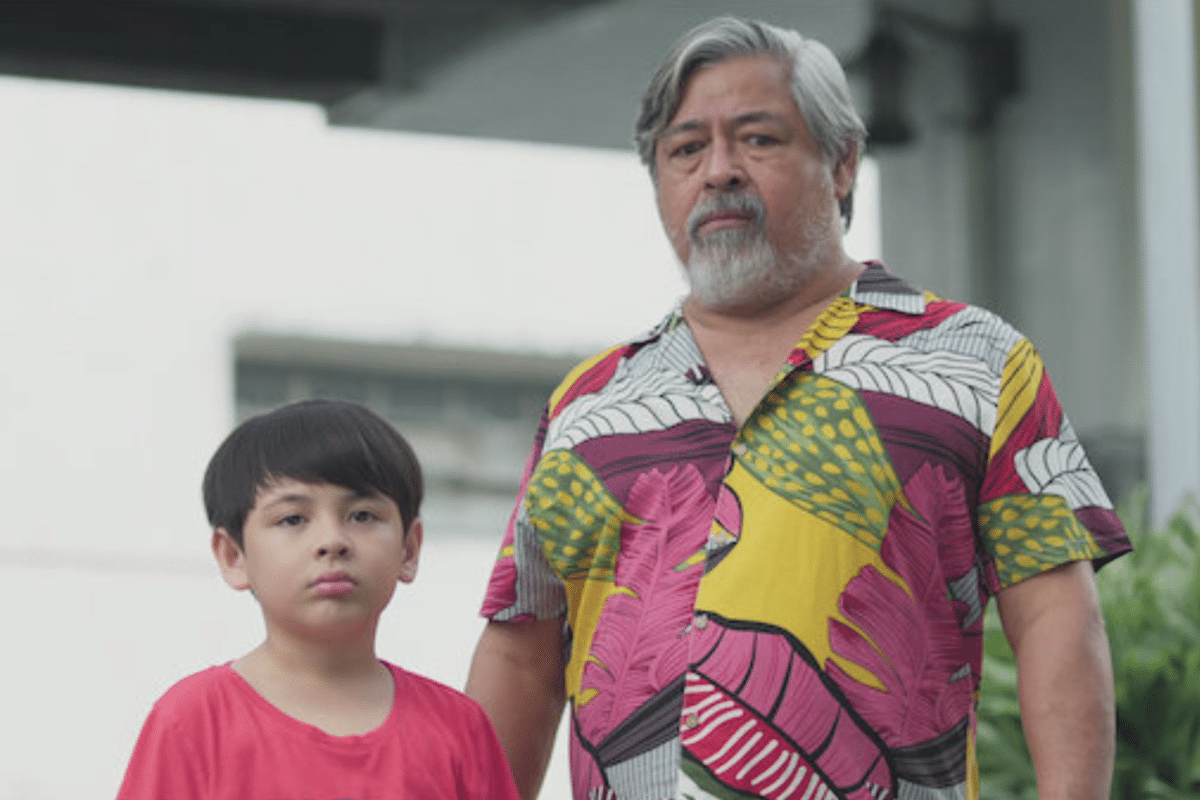
(From left) Euwenn Mikaell Aleta and Joel Torre in a scene from “Lolo and the Kid.” Image: Courtesy of Netflix Philippines
Filmmaker Benedict Mique set the record straight on a scene from the film “Lolo and the Kid,” where child wonder Euwenn Mikael Aleta flashed a middle finger before he was stopped by Joel Torre, as he reiterated that it’s part of the script.
“Lolo and the Kid,” starring Torre, Aleta, and Juan Karlos Labajo, tells the story of an elderly man who makes ends meet by scamming other people, with the help of Kid who he took in as his own grandson.
One of the scenes in the hit film showed Kid (Aleta) responding to another child’s teasing by flipping the proverbial bird, but this action immediately gets a reprimand from his Lolo Mario (Torre).
Many viewers claimed that scene was unnecessary and should have just been omitted as it might send a damaging message to children.
This was addressed by Aleta’s mother Cristal on Facebook on August 12, pointing out that the “bad finger” scene was a requirement of the role being a street child, and that Aleta even struggled to bring it to life.
Mique then explained that the scene was part of Aleta’s character and was retained in the script.
During an intimate media gathering in Quezon City on Wednesday, August 21, the film director was also all praises for Aleta both for his acting, and his kindness behind the scenes.
“To be honest with you, ‘yun ang nakakatuwa kay Euwenn. Ang bait niyang bata. Hirap na hirap siyang gawin ‘yun. Sabi niya, ‘Gagawin ko ba ‘yun?’ [Sabi ko sa kanya], magkakaproblema siya kung hindi inawat. But the point of the scene was that the boy was doing something wrong, and the lolo was telling him it’s wrong. How can the Lolo say it’s wrong kung wala naman siyang ginagawa, diba?” Mique explained.
(To be honest with you, that’s what impressed me about Euwenn. He’s a nice kid. He had a hard time doing it. He said, “Do I have to do it?” I told him that there would be a problem if he didn’t stop himself from doing it. But the point of the scene was that the boy was doing something wrong, and the Lolo was telling him that it was wrong. How can the Lolo say it’s wrong if he’s not doing anything, right?)
WATCH: “Lolo and the Kid” director Benedict Mique addressed a scene in the hit film involving child actor Euwenn Mikaell Aleta, where he did the “bad finger.” | @HMallorcaINQ pic.twitter.com/WKlBFAl16R
— Inquirer (@inquirerdotnet) August 22, 2024
Mique also shared that the particular scene was only done in two takes. This is due to Aleta doing the middle finger so fast, that the director and production weren’t able to capture it properly. The director also recalled that Torre did his best to assure Aleta behind the scenes.
“Sinasabi ni [Euwenn], ‘Gagawin ko ba ‘yun?’ ‘Oo, nasa script ‘yan. Sasawayin ka naman ni Lolo.’ He’s going to teach a lesson to other kids. Ang bilis nga niyang ginawa, parang dalawang [takes],” he said. “Kasi ‘yung una, hindi namin nakita. Si Tito Joel [Torre] nga, sabi, ‘Gawin mo na para matapos na tayo. Mabilis lang ‘yan. Pagsasabihan naman kitang bawal eh.’ So, gan’un.”
(Euwenn said, “Should I do it?” “Yes, it’s part of the script. Lolo will reprimand you anyway.” He’s going to teach a lesson to other kids. He did it so fast, it’s like it was done in two takes. We didn’t see the first take well. Tito Joel Torre also told him, “Do it so we can be finished. It will be quick. I’m going to reprimand you anyway.” So that’s that.)
Despite the explanation, Mique said critics continued to take certain scenes out of context, resulting in the backlash.
“Minsan, alam mo naman sa digital age, ini-screen cap so akala ng mga tao, masama. Out of context ‘yun. Hindi ang bata or ang pelikula ang may kasalanan. Ikaw na nag-screencap at nag-post ang may kasalanan. Kahit saan naman, it was being shown out of context,” he said.
(In the digital age, some would screencap certain scenes which would lead others into thinking it’s wrong. It was out of context. Neither the kid nor the film are at fault. It’s the person who took a screencap and posted it who is at fault. It was being shown out of context.)
Also in the roundtable, Aleta said working on the film with Torre made him realize that they’re “good people” in and out of the camera.

